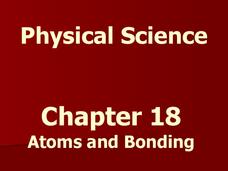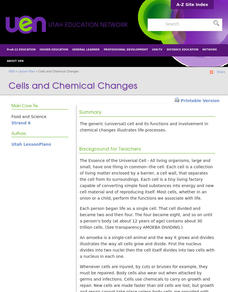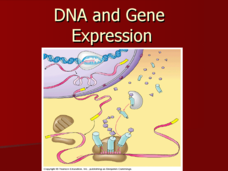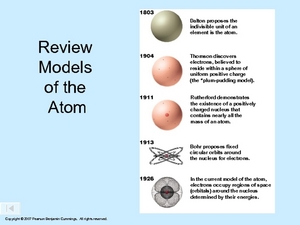NASA
Atoms, Elements, and Isotopes
Rings and golden nuggets contain the element gold, but how small can you break it down before it is no longer considered gold? A helpful presentation explains the basics about atoms, elements, and isotopes through a presentation.
Virginia Department of Education
Radioactive Decay and Half-Life
Explain the importance of radioactive half-life as your high school biologists demonstrate the concept by performing a series of steps designed to simulate radioactive decay. Pupils use pennies to perform an experiment and gather data....
Jefferson Lab
The Shape of Things
Here is an interesting science lesson/activity which has learners working in groups in order to simulate experiments done at the Jefferson Science Lab. For this one, groups use a pie tin, a Hula Hoops, a marble, and a magic marker to...
Curated OER
Nuclear Reactions
Starting with a recap of atomic structure, these slides continue by comparing different isotopes of uranium and explaining which are stable and which have a decay period and emit alpha or beta particles. Gamma decay is just mentioned on...
Curated OER
The Building Blocks
This PowerPoint is a comprehensive review of all the facts related to an atom's basic structure and function. What makes this unique is that it is geared toward an audience of junior geologists. After introducing the periodic table of...
Curated OER
Atoms and Elements - Electron Arrangement and Periodic Law
Delve into the world of quantum mechanics by viewing this PowerPoint. Chemistry novices learn about electron energy and shells, and they practice listing electron configuration for different atoms. Because this presentation provides...
Grand Erie District School Board
Model Cell Project
If you're finishing up a unit on cells, here's a great project to get kids collaborating and recalling what they've learned in a fun and tangible way. Small groups create plant or animal cells out of materials they have at home. They use...
Mr. E. Science
Atoms and Bonding
I don't trust atoms because they make up everything. Budding scientists learn about famous scientists connected to atomic models, chemical, ionic, and hydrogen bonds. The presentation also presents how to count atoms...
National Energy Education Development Project
The Science of Energy
Did you know the word energy comes from energeia, a Greek word? Introduce learners to the four types of potential energy, five types of kinetic energy, and energy transformation with a presentation about where we get our energy and...
Cold Spring Harbor Laboratory
RNA Is an Intermediary Between DNA and Protein
For years, scientists believed tRNA was junk left over from larger RNA. Three scientists used different approaches to prove tRNA actually exists as the connection between DNA and protein. Learn about their experiments, their lives, and...
Curated OER
Cells and Chemical Changes
The billions of cells that make up all living things are the focus of this resource. Understanding the differences between the cells that make up plants and animals is an important distinction; it is covered here quite-well. Some...
Curated OER
Gumdrop Crystal Models
A great way to learn about molecular structures is to make a model. Gumdrops and toothpicks are used to construct crystal models. The models are based on theories of crystal shapes that occur because of positive and or negatively charged...
Curated OER
Atoms, Ions and Formula Basics Make-up Test
Using a copy of the periodic table, chemistry test takers fill in a chart with element name, chemical symbol, atomic number, atomic mass, and numbers of subatomic particles. They define subatomic particles, draw atom models, explain...
Curated OER
Raven Chapter 18 Guided Notes: Control of Gene Expression
So often, genetics worksheets focus on alleles and heredity. Here is one that focuses on the steps of the gene expression process. After reading a textbook chapter or listening to your lecture, AP biology buffs write short answers to...
Curated OER
DNA and Gene Expression
The many slides and images in this PowerPoint are clear and relevant to the detailed content covering the details of DNA structure, replication, cell differentiation, and mutation on an advanced level. The slideshow summarizes all of the...
Curated OER
Looking At Plants and Animals
Even though the presentation is connected to a particular textbook, it could be used in any lower elementary classroom to review plants. There are diagrams and colorful graphics that make it attractive and engaging.
Curated OER
Atoms, Molecules and Ions
Atomic theory, experiments that contributed to our knowledge of matter, atomic structure, isotopes, and ions are covered in these 33 slides. Quality diagrams and labeled charts will help activate understanding. The presentation concludes...
Curated OER
Atomic Theory
An extremely thorough presentation walks new chemists through the basics of matter. There really isn't a unifying theme, however So many topics are covered: forces, elements, atomic structure, chemical properties, compounds, quarks,...
Curated OER
Review Models of the Atom
Multiple representations of the varying theories of atomic structure. With these pictures and some background of the theories and scientific figures surrounding them, your class will develop a better understanding of scientific history...
Texas State Energy Conservation Office
Investigation: Splitting Atoms
In a simple activity, physical scientists model nuclear fission using a droplet of oil. This can be used alone in a unit on different types of energy, or as part of the energy conservation unit produced by the Texas State Energy...
Virginia Department of Education
The Modern Model of Atomic Structure
The difference between atomic mass and atomic number can be confusing for some young chemists. Help your class better understand the concepts by allowing them to sketch an atom on paper and then discuss their experience. Upon completion...
Virginia Department of Education
Historical Models of Atoms
What does the past have to do with today? Young scientists find that answer as they learn more about past chemists and their significant contributions to the field. Pupils use the Internet to research historical figures...
Glynn County School System
Milky Way Galaxy
There is more about the Milky Way that scientists don't know than what they do know—that leaves a lot to discover! A thorough lesson presentation explores the components of the Milky Way Galaxy and their behaviors.
Biology Junction
Protein Synthesis
Watson and Crick built the first model of DNA in the 1950s, and our understanding of DNA since then continues to grow exponentially. Scholars learn about protein synthesis by observing a presentation and completing a worksheet. Both walk...
Other popular searches
- Cell Nucleus
- Atomic Nucleus
- Comet Nucleus
- Nucleus Dna Replication
- Nucleus of Cells
- The Nucleus
- Nucleus Radioactivity
- Condensation Nucleus
- Nucleus Discovery
- Chromatin Nucleus
- Nucleus and Human Body
- Nucleus Partners























